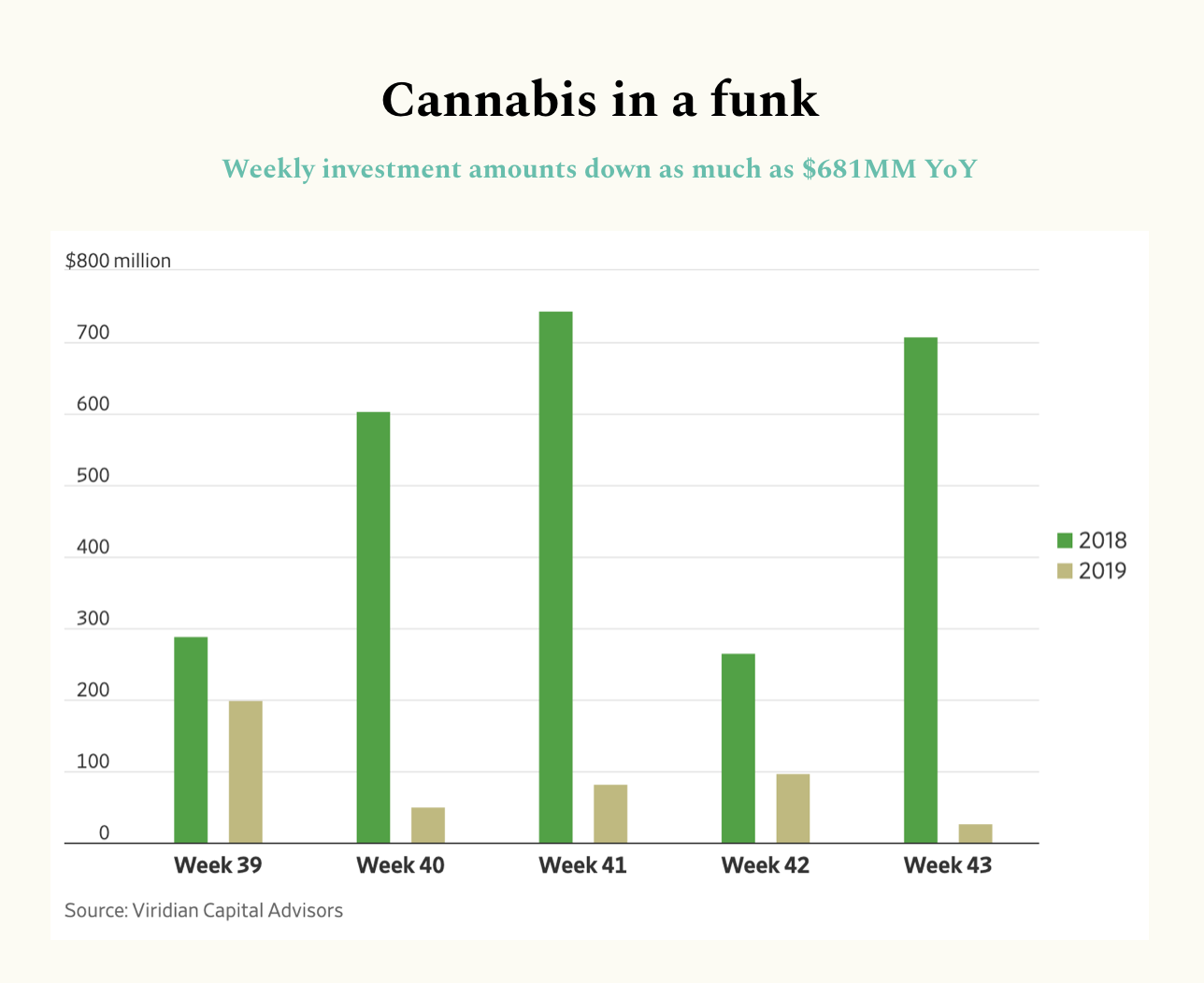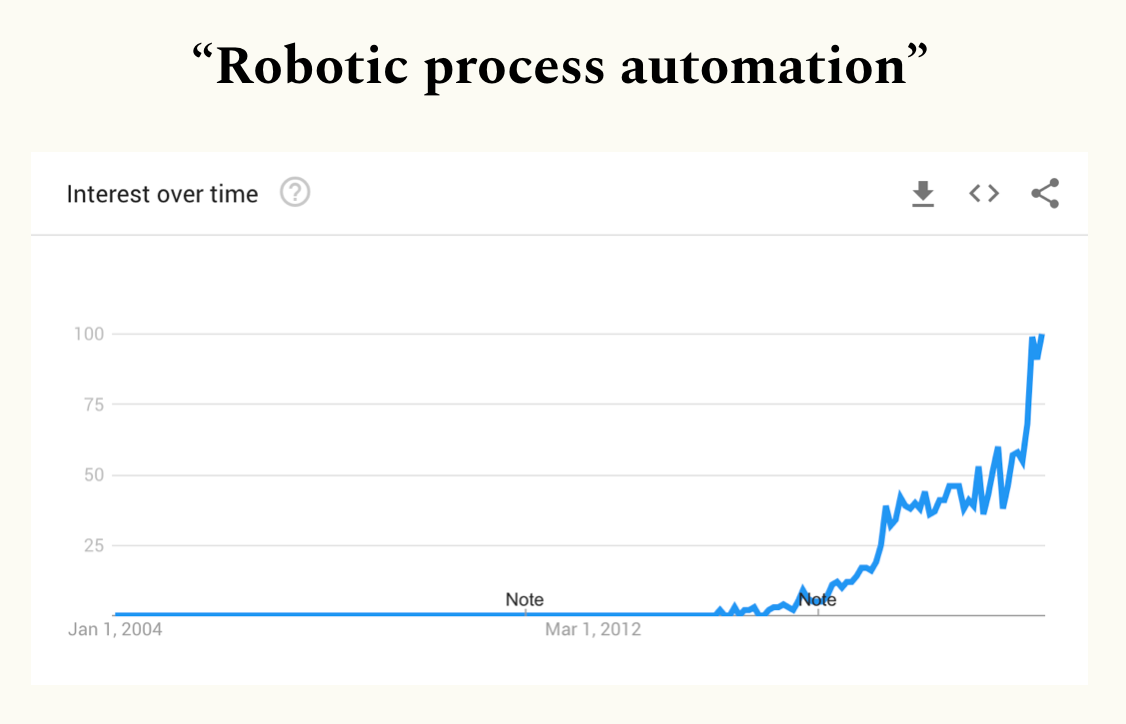
In this week’s BB, you’ll learn about…
⚡ Softbank’s new rules
☠️ Silicon Valley’s quest for everlasting life
🧯 Burn out in the cannabis market
🍕 DNA databases and a Domino’s atrocity
🤑 A better way to share the wealth
🤖 Rise of the office robot
🎲 Mystery jobs
💄 Pessimism, eating sharks, and looking good in prison
—
👉 If you’ve been digging the Briefing and would like to help, please share this email with someone unusually thoughtful.
🐰 Overheard
(Quotes from clever people)
If you want to raise billions of dollars in ten minutes to fund the sort of blitzscaling that will obliterate your competitors and leave you in sole control of a massive market, there is basically one person you can call, so you need to set up your company to appeal to SoftBank.
Bloomberg’s Matt Levine discusses Softbank’s decision to restrict dual-class shares. In a founder-friendly market, investors have been willing to acquiesce to structures that keep voting power in an entrepreneur’s hands. While traditional VCs might have felt unable to push back on these terms for fear of losing out on a hot deal, Softbank’s singular positioning equips them to reverse the trend. Post-WeWork-debacle, the price of shaking hands with Masa may be a loss of control.
☠️ Monitoring: Immortality
(One space worth keeping an eye on)

The problem: in time, death comes for us all. Humans — like Apple products — have been built with planned obsolescence in mind. Like every other living thing (let us not dwell too long on the turritopsis jellyfish), we must make do with a finite lifespan.
The solution: take a page out of the Tuck Everlasting playbook. In other words, live forever. The hubris of Silicon Valley knows no bounds — a handful of startups are exploring ways to extend our body’s shelf life, or eschew the limits of biology altogether and push our essence to the digital realm.
Supplements. Living forever may be as easy as simply taking the right pill. At least, that’s the bet Elysium is making. The company’s first product, ‘Basis’, seeks to provide the biological benefits of fasting, without the unpleasantness of actually missing a meal. Earlier this week, Elysium added ‘Index’ to their product suite, a “biological age” test which shows the miles on your body clock. Others in the space include Alphabet’s well-funded, deeply secretive subsidiary, Calico, and Unity, which plans to provide medication to attack the “zombie toxin” produced by aging cells.
Transfusions and injections. Keeping ourselves young may involve infusing our aging husk with new material. Tech’s Nosferatu, Peter Thiel, is a famous supporter of parabiosis, the transfusion of young blood into the body. Ambrosia was one company touting the practice’s health benefits before being shutdown by the FDA. Undeterred, the founder appears to be launching a slightly tweaked new venture called Ivy Plasma. They join Alkahest in the space. Beyond blood, Peter Diamandis’s Celularity, is working to bring “fresh cell therapy” to the masses, focusing on placental stem cell infusions.
Digitization. Do we really need to fix our bodies? Or would we be better off junking imperfect hardware in favor of seamless software? Nectome, a YC graduate, intends to extract memories from our brain to store in the cloud, while Replika’s chatbot collects conversational data in order to reproduce our personalities, virtually. Eternime has a similar goal, asking users for photos, memories and stories in order to create an avatar designed to stand the test of time.
Where next? China’s first emperor, Qin Shi Huang took mercury pills in an attempt to extend his life. We may look back on many of the medical procedures described above as dangerous junk science. For that reason, I’m most intrigued by the virtual realm, at least in the short-term. Earlier this week, James Dean was ‘cast’ in a new film. The facsimile of the Rebel Without a Cause actor is by no means sentient, but it’s an illustration of the current ability to create immortal likenesses, as well as a sign of latent commercial potential. While fodder for a longer discussion, I’m also interested in companies tackling the notion of perceived time. Perhaps the way to extend our lives is simply by altering the way we experience it, either through drugs, brain implants, or virtual reality.
🖼️ 1000 words
(Something to look at)

The grass is not so green. After a ludicrous 2018 in which $10B of investment poured into the industry (2x the previous 3 years combined) cannabis companies are returning to earth. Perhaps counterintuitively, legalization has been a major part of the problem. The tax and regulatory burdens placed on legal purveyors have resulted in a product 77% more expensive than the black market. Underwhelming sales in states like California are the result.
As might be expected, this has resulted in a pullback from providers of capital. Investment during the week ending October 25th shrunk from $707.8MM to $26.8MM, debt is hard to come by, and depressed valuations make equity raises unappetizing. Those best positioned may be real estate buyers like IIPR. Since September, the REIT has bought property from four cannabis companies, leasing it back at attractive terms.
😱 Signs of the apocalypse
(Look on my Works, ye Mighty, and despair!)
Mom, you were right. When I decided to get my DNA tested via 23&Me, my mother was adamant that at some point, my genetic information would become visible to prying eyes. Earlier this week, a Florida judge granted a detective access to DNA database GEDMatch, and the information of its nearly 1MM users. While news of my haplogroup (let’s go Team H!) is safe from law enforcement for now, this sets a precedent which other providers may be forced to follow in time.
Bernays would be proud. The ability to know who we are and what we want without direct input may be possible in the future, creating a form of ‘inferred’ advertising. Data derived from psychographic tests, facial scans, and IoT devices will create complex pictures of consumers that may be undesired, and difficult to shake.
What fresh hell is this. Domino’s, relentless innovator of the pizza world, announced a new concoction for its Taiwanese locations: cheese, topped with boba tea. Apparently, “people don’t hate it.”
🚢 Shipping news
(The most interesting product launch this week)

Sharing money. If you’ve struggled with Splitwise, or used a Google Sheet to track Venmo charges from a group trip, you understand the pain Compound is trying to solve. In addition to P2P payments, the company allows users to create shared accounts, accessible through a physical card. You could have an account for you and your partner, one for your rec league team, and another for your upcoming ski trip.
This is a problem close to my heart, both because I jammed on something similar in grad school (s/o Jon H), and because despite the proliferation of consumer fintech apps, few tackle anything beyond the simplest of use-cases. Building a permissions layer on money is novel, necessary, and if done correctly, potentially powerful. I’ve been impressed by the thoughtfulness of Compound’s product, as well as the elegant aesthetic.
—
Honorable mentions: Glide Pro, Florida Man, Scout, Powerup.
📡 Signal
(One exploding Google Trend)

Accelerating automation. Getting a robot to do your boring, repetitive work is every employee’s dream. It’s also the explicit goal of Robotic Process Automation (RPA) solutions. This summer, Gartner announced RPA was the fastest growing market in enterprise software with revenue increasing 63.1% in 2018. Interestingly, the most rapid growth occurred outside the top-5 vendors, suggesting strong opportunities for insurgents. Provider NTT-AT grew revenue a staggering 480.9% between 2017-18.
This past week, a particularly interesting entrant announced their round: Robocorp raised $5.6MM to build a cloud-platform on top of the open-source Robot Framework project. I am watching closely.
📈 Jobs for interesting people
(Openings at companies and funds building something cool)
Business Development Manager - Bison Trails (NY). This company is building infrastructure for crypto-economy, and has the team to deliver. Rocket ship in the making.
Director of Marketing - Prose (NY). For those that never have a bad hair day.
Intern - HOF Capital (NY). The backers of Uber, Alibaba, Niantic and plenty more are looking for someone to jump aboard. Looks like a great opportunity.
VC Associate - Mystery Firm (NY). Roll the dice and join this ‘top’ firm.
Senior Frontend Engineer - Crunchbase (SF). Put up more paywalls.
Workplace Operations - Zipline (SF). This company has delivered vital medication 20K times, by drone. You’ll make sure the team keeps ticking.
Account Executive - Remix (SF). Help make the BART, MTA and rest of the world’s transportation systems actually work.
Senior Product Manager - Indio (Austin). Unsexy problem; massive market.
Data Scientist - One Drop (Austin). Use your skills to improve diabetes care.
Product Manager - Cameo (Chicago). Be the person who knows how to get a shoutout from John Stamos at a moment’s notice.
Student/Builder - a16z Crypto Startup School (Anywhere). Get guidance from smart folks obsessed with decentralization.
🐒 Long tail
(Best of the rest)
The four day work week. Microsoft Japan ran an experiment this past August — it gave employees Friday off. The experiment resulted in a 40% productivity jump, as well as a happier workforce.
In the shadows. Despite spending $649B a year on its defense (more than the next seven biggest spenders combined), the US may be falling behind countries like Russia, Iran, and China. The problem is not a lack of equipment but strategic intelligence, meaning we’re ill-equipped to win the “shadow wars” that define modern combat.
Modern friendship. For $3.33/month friends of @sighswoon get access to details of the influencer’s love life. She is one of many finding novel ways to monetize their audience, including by asking fans to pay to be ‘Close Friends’ on Instagram.
Farewell, Barneys. The New York fashion institution was stripped for parts this week with Authentic Brands Group buying the company’s name rights. Authentic plans to open “pop up retail experiences” in the defunct retailer’s Madison Avenue location.
Color Wars. Deutsche Telekom sent a cease-and-desist letter to start-up Lemonade over the insurance company’s use of magenta in its branding. This is far from the teleco’s first act of tincture territorialism — it has made similar demands of Engadget, AT&T and dataJar. Very silly.
Juicing exclusivity. In a quest to rise in the national rankings, colleges are buying student SAT data, soliciting many that perform worse than the median admit rate. Rejecting these students when they eventually apply keeps the school’s acceptance percentage low. Rather cruel.
Fashion rebellion. Researchers from Northeastern, MIT and IBM have created a T-shirt that renders its wearer invisible to AI recognition systems. I expect ‘adversarial design’ to become increasingly popular.
Biohacking addiction. A chip was implanted into an opioid addict’s brain in an attempt to alter the man’s relationship with the drug. Deep brain simulation may be a viable remedy for difficult-to-treat cases.
Illegal Seafood. 15% of the swordfish consumed in the world may actually be shark. Without a simple way to ensure authenticity, most of the fish in the world goes untested, resulting in a market vulnerable to counterfeiting.
“Best at being worst.” Residents of a Puolanka, Finland were sick of the perceptions of dereliction and ugliness that dogged the town. In search of an identity, they stumbled upon something they could be the best at: pessimism.
The Bitcoin Thief. Iceland is not a country known for its crime — only one murder was committed in the whole of 2018. But as crypto-mining moved to the island — attracted by the cold climate, abundant energy and cheap real estate — swindlers followed.
Jailhouse mascara. After Christina Randall’s release from prison, she struggled to hold down a job. She found a career on YouTube, sharing the beauty hacks she’d used in prison with the masses. A few tips? Use Dorito dust as lip balm, or coffee grounds as mascara.
📜 Revisionist history
(Mea culpas and responses to readers)

Last week, I wrote about “ubiquitous veganism,” and the expected shift towards cultured and plant-based meat. As part of that discussion, I cited an article which noted the connection between red meat and disease.
Thank you to reader Issam F., for providing a valuable counter-argument. In this piece, Dr. Peter Attia, a health and longevity specialist, unpacks the problem with these sorts of studies. In short, many compare unhealthy carnivores to healthy vegans, confusing the presence of meat in the first group’s diet as the critical distinction while ignoring other differences. A valuable reminder of lurking variables and flawed control-groups.
🧩 Puzzler
(A question, conundrum, or riddle to mull over)
A man is found dead in his home. On the wall of his kitchen is a calendar on which the numbers 6, 4, 9, 10, 11 are written in blood. After some investigation, the police narrow their search down to 5 suspects: Gary, Olivia, Jason, Peter, and Julie. Who is the murderer?
Charlie L. wasted no time in delivering the correct answer to last week’s riddle:
Turn one switch on, keep one switch off, and turn one switch on for a few minutes, before turning it off. Go upstairs. One lightbulb will be on, and two will be off. In order to distinguish between the two that are off, feel which is warm. That’s the one you switched on and off.
Well done. Congratulations also due to Stephen C., Mike M. (who noted that such a process would not work for lights that don’t emit heat), and Nick T.
Thank you all for reading, and wishing you an enjoyable Sunday brunch, and laid-back end to the week. 💙


